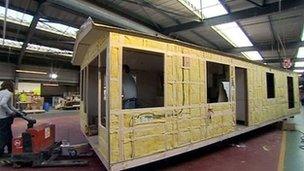Pasty tax: U-turn 'a shambles' says Labour
- Published
- comments
Treasury minister David Gauke: "We have still delivered a budget that is good for the public finances"
Labour has condemned the way the government has dealt with planned VAT rises on Cornish pasties and static caravans as a "total shambles", following a reversal of the plans.
The U-turns from Chancellor George Osborne's Budget follow protests by bakers and caravanning enthusiasts.
The government said it showed it was listening, but Labour said the VAT rises had been "ill thought-out".
A 5% rate of VAT on static caravans will be delayed until April next year.
And the government has altered the definition of what is a "hot" pasty to allow the reversal of its plans.
Currently, VAT is not charged on most food and drink, or hot baked goods, but is payable on takeaway food sold to be eaten hot.
'Ill-thought through'
Shares in bakery firm Greggs rose 8% on the news but Labour's shadow chief secretary to the Treasury, Rachel Reeves, described the policy reversal as "a total and utter shambles".
She said: "These partial U-turns, just a few weeks after ministers were defending the pasty tax and caravan tax, show just how ill-thought through the Budget was and how out of touch David Cameron and George Osborne are."
Ms Reeves accused ministers of trying to avoid a Commons defeat on Labour's upcoming motion - especially after their support dropped over Parliament's last vote on the caravan tax.
After the amendment, food such as sausage rolls or pasties sold on shelves - that is, cooling down, rather than being kept hot in a special cabinet - will not be liable for VAT.
The definition of a "hot" pasty is being altered to allow the reversal, while a 20% charge due to be levied on static caravans will now drop to 5%.
The government said it had improved the policies after engaging with concerns.
It estimates the U-turns will cost £70m in total lost revenue in the financial year 2014/15.
'Addressing concerns'
During a parliamentary debate last week, MPs from all three main parties criticised Mr Osborne's proposals, arguing they were unenforceable and would have an adverse impact on jobs and businesses.
However, hot savouries, including pasties and pies are exempt. The U-turn would effectively maintain this situation where they are left to return to "ambient temperatures" on shelves in bakeries and supermarkets.
Bakery firm Greggs, which was leading a campaign against the proposals, said it welcomed the government's change of heart.
"This is fantastic news for the customer more than anything," said the firm's chief executive Ken McMeikan.
"If we had to put up prices by 20% in the current marketplace when consumers are having a very difficult time we expected there would be an impact on sales but we don't know what it would have been. I think the government deserves to be applauded."
'Simple regime'
Static caravans do not currently incur VAT and The National Caravan Council had warned that levying VAT at 20% would threaten 7,000 manufacturing jobs and cost the tourism industry more than £100m in reduced business.
Several Conservative MPs rebelled when the issue was voted on in April, reducing the government's majority to 21, and Labour had been planning to force another vote on the issue when Parliament returns from its current recess.

Owners of static caravans will have to pay just 5% VAT, rather than 20%
Graham Stuart, Conservative MP for Beverley and Holderness, said the climbdown was "a victory for the campaign to persuade the government to think again".
Treasury Minister David Gauke said the government has listened to "representations" from the industries affected while still addressing some anomalies in the VAT system.
On the issue of VAT on takeaway food, he said "we have a simpler system than we previously had and we have improved the position".
The changes of policy are the latest in a series of rethinks on measures announced in March's Budget.
Ministers recently announced a £30m compensation package for churches to offset a proposed increase on VAT on alterations to listed buildings to 20%.
There have also been calls for a planned cap on tax relief on donations - of £50,000 or 25% of income a year - to be scrapped amid concerns it will hit philanthropy.
- Published30 September 2012
- Published29 May 2012
- Published29 May 2012
- Published18 May 2012
- Published22 May 2012